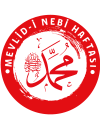INTERNATIONAL MAWLID AL-NABI SYMPOSIUM
“ OUR PROPHET AND THE BUILDING OF PERSONALITY”
(24-26 September 2024)
Our Almighty Lord created man in the most beautiful way, equipped him with reason and will, and subjected him to a test with his choices between faith and disbelief, good and evil, beauty and disgrace, obedience and rebellion. Humankind has learned how to be a servant to his Creator, how to worship Him, how to behave in their relations with their environment and how to prepare for eternal life through revelation and prophets, who are the reflection of revelation in life. This is because man will find the most accurate answers to all his questions about the meaning and purpose of life, the beginning and end of existence, the source and validity of knowledge only with reference to revelation and the Sunnah.
Personality is a concept that defines a person, includes both innate and acquired qualities, and refers to all the spiritual and moral characteristics of the human self. The hadith “There is none born but is created to his true nature (Islam). It is his parents who make him a Jew or a Christian or a Magian.” (Bukhari, Tafsir, (Rum) 2; Muslim, Qadar, 22) draws attention to the importance of family, education and environment in the formation of personality.
The last Prophet Muhammad (saw) was commissioned to remind man, who was created as the caliph of the earth, of the purpose of his existence and to guide him to form his personality in the most perfect way. Under the guidance of the Qur’an and the Sunnah, the Prophet Muhammad (saw) ushered in an era of enlightenment, peace, and tranquility for humanity, which had been in darkness, crisis and conflicts due to attitudes and behaviors contrary to the nature produced by the Jahiliyyah environment. For this reason, the Messenger of Allah is undoubtedly the best example for the building of personality, identity and sense of servitude. Allah the Almighty says in the Holy Qur’an: “Indeed, in the Messenger of Allah you have an excellent example for whoever has hope in Allah and the Last Day, and remembers Allah often.” (Ahzab, 33/21)
The teachings of the Prophet (saw) transcend the boundaries of specific regions, eras, locations, or nationalities. He is what everyone and every age needs. Therefore, the only salvation of humanity and the building of a peaceful society, regardless of the age, region or level of development, is to take the life of Prophet Muhammad Mustafa (saw) as an example.
The most fundamental factor in the building of personality is faith. Faith is a great blessing that forms the Muslim’s personality, gives him an identity and makes both his world and Hereafter peaceful. A Muslim knows that his faith will be perfected and come to life through worship and good morals. A Muslim is a responsible person who believes in Allah wholeheartedly and worships with sincerity. He is a person of personality who preserves and develops the potential in his nature.
In this framework, the subject of the International Mawlid al-Nabi Symposium, which will be organized by the Presidency of Religious Affairs of Türkiye in 2024, has been determined as “Our Prophet and the Building of Personality”.
Objectives of the Symposium
Objectives of the symposium are to address the building of personality in today’s changing and developing world on the basis of the Holy Qur’an and Sunnah al-Saniyyah; to offer solutions to problems centered on personality, character and morality, especially in the perspective of the prophetic method; to contribute to the development of the services of our Presidency by benefiting from the ideas, thoughts and experiences put forward on the occasion of the symposium.
-
Human Characters in the Holy Qur’an
-
The Importance Attached to the Character Building of Children and Youth in the Holy Qur’an
-
Moral Concepts and Personality Building in the Holy Qur’an
-
The Relationship between the Purpose of Creation and Human Character
-
Prophet Muhammad (saw) as the Uswa al-Hasanah in Personality Building
-
Personality Building of Children and Youth under the Guidance of the Prophet
-
Moral Concepts in the Hadiths
-
Works on Personality Building in the Hadith Studies
-
The Example of the First Generations in the Human Development of Our Civilization
-
Practices for Personality Building in Our Civilization (Foundations, Associations, Professional Organizations, etc.)
-
The Role of Women in the Character Building in Our Civilization
-
Personality Building in Our Religious, Historical and Literary Studies
-
Methodologies for Approaching Children and Young People in Personality Building
-
The Role of Family in Personality Building
-
Factors Affecting the Personality Building (Belief, Social Media, Digital World, Press, Environment, Globalization etc.)
-
Values Education in Personality Building and Practical Examples (Mosques, Qur’an Courses, NGOs, Schools, Educational Institutions, etc.
-
Identity Building of Youth in the Modern Era, Challenges and Possibilities
Honorary Chairman of the Symposium
Prof. Dr. Ali ERBAŞ, President of Religious Affairs of Türkiye
Scientific Committee of the Symposium
Prof. Dr. Abdurrahman HAÇKALI, Presidency of Religious Affairs, Türkiye
Prof. Dr. Huriye MARTI, Presidency of Religious Affairs, Türkiye
Prof. Dr. İbrahim Hilmi KARSLI, Presidency of Religious Affairs, Türkiye
Assoc. Prof. Dr. Selim ARGUN, Presidency of Religious Affairs, Türkiye
Assoc. Prof. Dr. Enver Osman KAAN, Presidency of Religious Affairs, Türkiye
Prof. Dr. Abdullah KAHRAMAN, Presidency of Religious Affairs, Türkiye
Prof. Dr. Ali AVCU, Presidency of Religious Affairs, Türkiye
Prof. Dr. Enbiya YILDIRIM, Presidency of Religious Affairs, Türkiye
Prof. Dr. Eyüp BAŞ, Presidency of Religious Affairs, Türkiye
Prof. Dr. Halit ÇALIŞ, Presidency of Religious Affairs, Türkiye
Prof. Dr. Halis AYDEMİR, Presidency of Religious Affairs, Türkiye
Prof. Dr. İhsan ÇAPCIOĞLU, Presidency of Religious Affairs, Türkiye
Prof. Dr. Metin ÖZDEMİR, Presidency of Religious Affairs, Türkiye
Prof. Dr. Ömer KARA, Presidency of Religious Affairs, Türkiye
Prof. Dr. Soner GÜNDÜZÖZ, Presidency of Religious Affairs, Türkiye
Assoc. Prof. Dr. Fatih KURT, Presidency of Religious Affairs, Türkiye
Assoc. Prof. Dr. Sevde DÜZGÜNER, Presidency of Religious Affairs, Türkiye
Prof. Dr. Saffet KÖSE, Izmir Kâtip Çelebi University, Türkiye
Prof. Dr. Mustafa SİNANOĞLU, Istanbul 29 Mayıs University, Türkiye
Prof. Dr. Şamil DAĞCI, Ankara University, Türkiye
Prof. Dr. Ali Osman KURT, Social Sciences University of Ankara, Türkiye
Prof. Dr. Hasan Kâmil YILMAZ, Istanbul Sabahattin Zaim University, Türkiye
Prof. Dr. Mustafa AĞIRMAN, Ağrı İbrahim Çeçen University, Türkiye
Prof. Dr. Mürteza BEDİR, Center for Islamic Studies (ISAM), Türkiye
Prof. Dr. Erdal TOPRAKYARAN, Eberhard Karls University of Tübingen, Germany
Prof. Dr. Ruggero Vimercati SANSEVERİNO, Eberhard Karls University of Tübingen, Germany
Prof. Dr. Merdan GÜNEŞ, University of Osnabrück, Germany
Assoc. Prof. Dr. Ahmet NİYAZOV, Azerbaijan Institute of Theology, Azerbaijan
Assoc. Prof. Dr. Aqil ŞİRİNOV, Azerbaijan Institute of Theology, Azerbaijan
Assoc. Prof. Dr. Elnure AZİZOVA, Azerbaijan Institute of Theology, Azerbaijan
Assoc. Prof. Dr. Sultanmurat ABZHALOV, International Turkish-Kazakh University, Kazakhstan
Dr. Sayed Ahmad HASHEMİ, Jalalabad University, Afghanistan
Dr. Damir MUHETDİNOV, Moscow Islamic Institute, Russia
Organizing Committee of the Symposium
Assoc. Prof. Dr. Burhan İŞLİYEN (Chairman)
Dr. Şaban KONDİ
Ahmet ÜNAL
Cemalettin GEZGİÇ
Fatih AKKOCA
Ahmet Şakir UZUN
İsmail ARABACI
Musa SAYGILI
Symposium Calendar
Symposium Date: September 24-26, 2024
Deadline for Submission of Abstracts : July 12, 2024
Announcement of Accepted Abstracts : August 09, 2024
Deadline for Submission of Papers : September 13, 2024
Announcement of the Symposium Program : September 19, 2024
Printing of Symposium Papers : 2025
Languages of the Symposium
Languages of the symposium are Turkish, Arabic and English.Location of the Symposium
The symposium will be held online.Conditions of Participation
- Paper abstracts shall be in Turkish, Arabic or English.
- Paper abstracts shall outline the subject and shall be between 300 and 400 words.
- Paper abstracts shall be sent via e-mail to mevlidinebihaftasi@diyanet.gov.tr using the participation form mevlidinebihaftasi@diyanet.gov.tr by using accession form.
- The texts of the papers shall be scientific, original, and between 5,000-7,000 words.
- The texts of the papers shall be prepared within the framework of the spelling rules announced at http://mevlidinebi.diyanet.gov.tr
Invitation to Paper Presentation
We would be honored to see esteemed scholars and researchers among us at the International Mawlid al-Nabi Symposium titled “Our Prophet and the Building of Personality”.
Announcements
Symposium Program
Contact information
Presidency of Religious Affairs
General Directorate of Religious Services
Üniversiteler Mahallesi Dumlupınar Bulvarı No:147/A 06800 Çankaya/ANKARA
Telephone : 0312 295 73 58 - 0312 295 70 59
Fax : 0312 284 55 25
E-mail : mevlidinebihaftasi@diyanet.gov.tr
Web Site : http://mevlidinebi.diyanet.gov.tr

